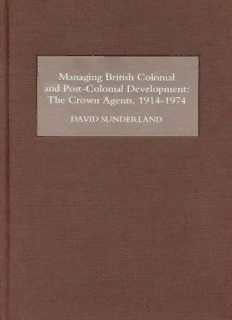
Managing British Colonial and Post-Colonial Development: The Crown Agents, 1914-1974 PDF
Preview Managing British Colonial and Post-Colonial Development: The Crown Agents, 1914-1974
Managing British Colonial and Post-Colonial Development Managing British Colonial and Post-Colonial Development The Crown Agents, 1914–74 David Sunderland THE BOYDELL PRESS © David Sunderland 2007 All Rights Reserved. Except as permitted under current legislation no part of this work may be photocopied, stored in a retrieval system, published, performed in public, adapted, broadcast, transmitted, recorded or reproduced in any form or by any means, without the prior permission of the copyright owner The right of David Sunderland to be identified as the author of this work has been asserted in accordance with sections 77 and 78 of the Copyright, Designs and Patents Act 1988 First published 2007 The Boydell Press, Woodbridge ISBN 978–1–84383–301–7 The Boydell Press is an imprint of Boydell & Brewer Ltd PO Box 9, Woodbridge, Suffolk IP12 3DF, UK and of Boydell & Brewer Inc. 668 Mt Hope Avenue, Rochester, NY 14620, USA website: www.boydellandbrewer.com A catalogue record for this book is available from the British Library This publication is printed on acid-free paper Printed in Great Britain by Biddles Ltd, King’s Lynn Contents List of figures and tables vi Acknowledgements ix Abbreviations xi Introduction 1 1 The public issue of loans 9 2 Other sources of finance 42 3 The management of colonial investment Funds 69 4 The management of the Joint Colonial Fund and the Joint 97 Miscellaneous Fund 5 The cost of supplies 115 6 Procurement from the early 1960s and delivery delays 143 7 Miscellaneous roles 160 8 The move into secondary banking 179 9 The collapse of the secondary banking venture 221 Conclusion 241 Appendices 1. The Crown Agents, 1920–74 254 2. Market finance, 1914–68 256 3. Non-market finance, 1920–65 260 4. 1954 Investment Funds, Wartime gifts and loans, 1936 procurement 265 and 1954 colonial appointments 5. Crown Agents’ own account activities 269 6. FMI investment in associated companies, 1969–74 270 Bibliography 279 Index 287 List of Figures and Tables Figures 1.1. Publicly issued loans and JCF/JMF advances, 1914–74 10 1.2. Annual average yields, 1920–69 14 1.3. Total value of stock domiciled with the CAs and amount held by 31 the CAs on behalf of colonial funds, 1947–62 1.4. Conversions, loans sold to the market/placed, and Inter-Colonial 34 loans, 1922–68 2.1. Nominal share and loan capital of UK companies that operated in 48 British Africa, Ceylon, Malaya and the British West Indies, 1938–57 and CDC expenditure 1949–65 2.2. UK government aid, 1919/20 to 1964/5 60 3.1. Value of Colonial Investment Funds and JCF/JMF at year ends, 70 1920–74 3.2. Distribution of Colonial Investment Fund and JCF/JMF 72 investments, 1930–62 4.1. JCF monies at banks, in securities and lent to colonies, 1929–69 99 4.2. JCF dividend rates relative to comparable investments, 1929–71 101 5.1. Supplies purchased, inspected and insured, 1920–74 116 7.1. Appointments, passages and pension and salary payments, 1920–67 161 8.1. Finvest account, 1970–74 180 8.2. Finvest lending, 1971–74 183 Tables 1.1. Characteristics of a sample of final purchasers of the Barbados 6pc, 37 1971/73 Loan 2.1. Finance of development, 1920–65 64 3.1. Distribution of Fund investments, 1935 and 1958 74 5.1. Stores purchased and shipped by territory, 1936 and 1964 117 5.2. Geographical location of contractors, 1937 128 For my sister, Mrs Ann Metcalfe Acknowledgements This book owes its existence to the Economic and Social Research Council, which financed the three year project on which it is based (grant no. RES–000– 23–0152), and to the Crown Agents, who gave me full access to their files. Many institutions have assisted me in my research. I would therefore like to thank the staff of the Bank of England archive; of the National Archives, Kew; and of the archive of the National Westminster Bank, London, and the Librarians at the British Library, London; at the Central Reference Library, Manchester; at the Guildhall Library, London; at the John Rylands Library, Manchester; at the London School of Economics Library; and at Manchester Metropolitan Univer- sity All Saints and Aytoun Libraries. Individuals from the Crown Agents who have helped me include John Shuter, the Deputy Head of Finance from 1967 to 1972 and later the Head of Invest- ment, and David Johns, the International Fund Investment Manager from 1967 to 1970 and later Assistant to the Director of Finance, who generously gave up their time to answer my often impertinent questions, and read and commented on the draft chapters of the book; Philip Knights, Company Secretary during the late 1960s and the early 1970s and later Archivist, who gave me a greater understanding of the culture of the Agency; Mrs Vivienne Challis, the widow of Allan Challis; and four people who prefer to remain anonymous. I would also like to thank Lynn Hale, the Crown Agents’ present Company Secretary, for all his help over the past few years; Jim McMahon who patiently ferried me back and forth to and from the Agents’ Liverpool file store; and the late A. W. Abbott, a former CA Company Secretary and Archivist, for his work on the history of the Agency. Thanks are also due to Peter Sowden, the History Editor of Boydell & Brewer for his great efficiency and interest in my work. Academic help came from Professor David Jeremy, who helped me devise the ESRC application and read and commented on draft chapters; Dr Geoff Tweedale, who patiently listened to my often boring accounts of the progress of my research and directed me to relevant books and articles; Professor Andrew Pendleton for his advice on ESRC applications; and, as ever, Professor Avner Offer, my doctorial supervisor at Oxford University, who taught me so much.
Description: